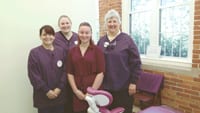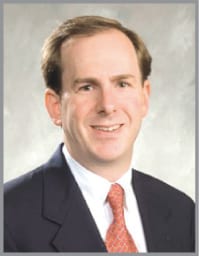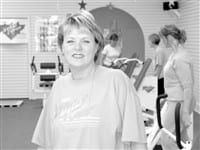Nothing to Fear – Strong & Healthy Smiles Stresses Preventative Care
Dr. Sue Keller jokes that she’s been interested in dentistry since she was 6, when she wasn’t able to eat cookies with loose teeth, so she figured out how to wiggle them and get them out as soon as possible.
But she does have other fond childhood memories of dentistry, like getting a cavity filled around age 9 and the floaty feeling from the nitrous oxide the dentist used. Or her blue-collar father working two jobs to make sure she and her brother could get braces to fix their crooked teeth and regain their confidence to smile. Both memories influenced the kind of practice she would one day run as Strong & Healthy Smiles in Florence.
“I hear about people having a bad experience at the dentist, but that doesn’t have to be the case. I had good experiences, and they can have good experiences, too.”
During her residency at Hartford Hospital, Keller considered an orthodontic practice, but decided — after training in settings from preventive care to trauma situations, working on accident victims — to practice more generally.
In 1995, she opened her practice in Greenfield, moving to a larger space in Florence in 2007, and has brought with her some of the concepts forged during her formative years, from conscious-sedation dentistry to an innovative program to help people pay for care — in other words, ways to make visiting the dentist a positive experience, not a negative one.
“There’s a joy in taking someone who hasn’t been to the dentist in five or 10 years and helping them get back on track and healthy again,” she told HCN, “so they keep coming back for maintenance.”
Root Causes
While dentists obviously know how to clean teeth, fill cavities, and install implants, Keller said she sees her role as helping people minimize those aspects of care by taking care of their oral health at home.
“We have a strong preventive-care program,” she told HCN, adding that people often stay away from the dentist out of fear, which only compounds as their teeth deteriorate over the years. If she can get them in good shape and convince them to continue good habits at home, the fear goes away as the visits get easier and easier.
To that end, she explained, “we test saliva six different ways and go through a very detailed evaluation of your habits at home, your diet, what you’re drinking, what teeth-cleaning products you’re using — and most of the time, we’re able to find out the likely reasons you’re getting cavities.”
Patients might receive special toothpastes, rinses, other tools, but more important, they get dietary and lifestyle advice to help them care for their teeth and prevent new cavities, she explained. “A good diet and good habits at home really keep people in good stead.”
Many dental habits ingrained in Americans for decades should be reconsidered, she went on. Take the common advice to brush twice a day, a message that emerged in advertisments from toothpaste makers in the 1950s. Since then, most people assume that means brushing upon waking up and going to bed, when the most critical times to brush are immediately after eating.
“Every time you eat, it puts carbohydrates in your mouth, which produce acids,” she explained, before relating a slightly gross metaphor she uses with kids. “I ask them if they wash their hands after they go to the bathroom to get the germs off. Well, when they eat, I say, they poop and pee in their mouth. That usually gets their attention.”
Rather than the wake-up and bedtime brushing regimen, Keller emphasizes brushing after every meal or snack. That’s usually no problem at breakfast and dinner, but people generally don’t feel like bringing a toothbrush to work, so she recommends after-lunch habits like Xylitol rinses and gums, or simply rinsing out the mouth with water. For people loath to floss, she recommends tools like GumChucks that make it easy to reach back into the mouth.
“Whatever someone’s problem is, I have a tool for them to try, as long as they’re willing to put in the effort,” she said. “I want to set you up for success. Maybe you can’t brush after every meal, every day, but if you can embrace the concept of cleaning your mouth after meals, and do it over the course of a lifetime, you’ll need very little dental care.”
For people who do need more attention, Keller is one of the few offices in the region offering nitrous oxide gas and sedation pills and non-surgical treatment of gum disease with lasers.
“When I meet someone with significant dental problems and can help them get their smile back, when they thought it was hopeless and nothing could be done, that makes me happy,” she said. “We can always do something for someone. Sometimes we have to replace teeth, but usually we can just maintain their health.”
Keep Smiling
Of course, it’s not just fear that keeps people away from the dentist; cost is a factor as well. It’s a particular problem for those without dental insurance through their employers, who decide they don’t want to pay out of pocket for cleanings and other basic procedures, which can lead to long-term issues.
That’s where Keller’s Smile Shares program comes in. Inspired by the region’s farm-share programs where people pay farmers up front and reap a harvest all year, Smile Share members pre-pay a discounted rate at the start of the year for their preventive care and then can access other discounted services throughout the year as well.
“Normal, regular care is affordable and protects you from more expensive, emergency care down the line,” she told HCN. And that’s the key — getting people who have avoided the dentist back to good health, and keeping them there.
“That’s really fun for me, to take someone with brown teeth and turn them into white teeth,” she said. “Then, it’s great when they come in for a regular maintenance visit, and they look great and don’t need much cleaning at all. That’s my ultimate success, when they keep up the good work on their own. There’s great satisfaction in keeping them motivated and on track.” And smiling, of course.




